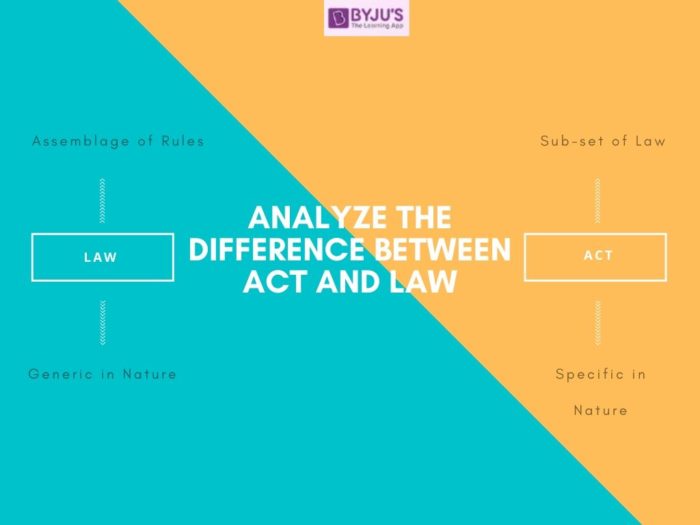The terms ‘Law’ and ‘Act’ have certain similarities in that they are used interchangeably at times. Yet, the key difference between them is that an act is passed by the legislative and a law is the rules and regulations enforced by the government.

Both are recurrent terms in the Polity segment of the IAS Exam. Within this context, this article will further highlight the key differences and similarities between Law and Act.
Aspirants can find more Difference Between Articles, by visiting the linked page
Differences between Law and Act
| Law |
Act |
| A law is defined as an assemblage of rules and regulations that are indispensable and must be followed. | An Act is a decree that is approved by the respective legislature, i.e. in India’s case, the State Legislative Assembly or Parliament of India. |
| Law holds its single purview over the larger picture. | An Act is a sub-set of Law. |
| Law ensures that the people will strictly follow the defined rules and regulations. | An Act is employed in specific situations meaning establishing regulations and rules in specified domains. An example of this is the Indian Companies Act which regulates the formation and functioning of companies or corporations in India. |
| Law is more generic in its nature of operations and is not that complicated to comprehend. | Acts are conditional and specific depending on the domains they have been applied for. |
| Law can be enforced as it has been established by the regulatory procedures. | An Act is represented by the bill it is passed for and will not be enforced until it becomes law. |
| A law is defined to stop malpractices, maintain public order, and, most importantly to protect Fundamental Rights. | Acts are made to make people aware of certain rules and regulations that are in place. |
| A law is an established phenomenon. | An Act is originally a bill which is proposed by the Parliament first and when it gets approval from the Lok Sabha and Rajya Sabha and the President as well, it becomes an act. |
| Laws are under regulation by government authority and hold sovereignty in them. | Acts are provisions enacted by a legislative body or the government for the people they understand the meaning of specific circumstances. |
Aspirants can find study materials for the UPSC Polity segment and similar articles through the links given below:
- UPSC Indian Polity Notes
- Syllabus and Strategy for UPSC Polity
- Difference between Polity and Political Science
- Difference between Lok Sabha and Rajya Sabha
- Difference between Lok Sabha and Vidhan Sabha
- Comparison between Parliament and State Legislature
- Important Amendments in the Indian Constitution
- Constitution of India
Difference Between Act and Law – Download PDF Here
FAQ about Law and Act
What are the main types of law?
What is the importance of law and act?
For more UPSC Exam related preparation materials, visit the following links given below:
Related Links
| NCERT Books | UPSC Exam Pattern | Current Affairs Quiz |
| Current Affairs PDF | World Current Affairs | UPSC Syllabus in Hindi PDF |
| Green Revolution in India | Pradhan Mantri Matritva Vandana Yojana | Project Tiger |
Comments